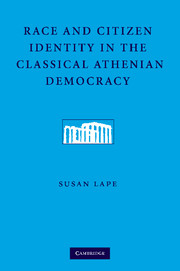Book contents
- Frontmatter
- Contents
- Preface
- Acknowledgments
- RACE AND CITIZEN IDENTITY IN THE CLASSICAL ATHENIAN DEMOCRACY
- 1 Theorizing Citizen Identity
- 2 The Rhetoric of Racial Citizenship
- 3 Euripides' “Ion” and the Family Romance of Athenian Racialism
- 4 Athenian Identity in History and as History
- 5 Trials of Citizen Identity: Policing and Producing the Racial Frontier
- 6 Myths and Realities of Racial Citizenship
- Abbreviations
- References
- Index of Names and Subjects
- Index of Passages Discussed
5 - Trials of Citizen Identity: Policing and Producing the Racial Frontier
Published online by Cambridge University Press: 05 May 2010
- Frontmatter
- Contents
- Preface
- Acknowledgments
- RACE AND CITIZEN IDENTITY IN THE CLASSICAL ATHENIAN DEMOCRACY
- 1 Theorizing Citizen Identity
- 2 The Rhetoric of Racial Citizenship
- 3 Euripides' “Ion” and the Family Romance of Athenian Racialism
- 4 Athenian Identity in History and as History
- 5 Trials of Citizen Identity: Policing and Producing the Racial Frontier
- 6 Myths and Realities of Racial Citizenship
- Abbreviations
- References
- Index of Names and Subjects
- Index of Passages Discussed
Summary
IDENTIFYING CITIZENS AND PROSECUTING FRAUDS
In democratic Athens, citizen identity was not directly linked to physical appearance. Still, the Athenians were concerned to keep aliens out of the citizen body. This raises the question of whether and how they knew a citizen or a fraud when they saw one? One answer is performance and context. Although it might seem circular, free persons who participated in politics and in the cultic rites exclusive to citizens, and who did not pay the metic tax, could be and were presumptively regarded as citizens. In addition, Solon's law forbidding slaves from exercising in the gymnasia had the de facto effect of associating this practice with citizenship. By excluding slaves from the gymnasia, the law also created the conditions for establishing physical appearance, that is, signs of physical cultivation, as a marker of citizenship. It is likely, though, that this distinction was weak because not all citizens had the leisure time to engage in a regime of physical cultivation, and because, as Aristotle is embarrassed to report, some slaves had bodies resembling those of free men. Still, the Athenians could have, if they wished, manufactured a visible sign of citizenship. Such practices were not unknown in other poleis. But most citizens in Athens wore a standard clothing style that was not exclusive to citizens.
- Type
- Chapter
- Information
- Race and Citizen Identity in the Classical Athenian Democracy , pp. 186 - 239Publisher: Cambridge University PressPrint publication year: 2010



